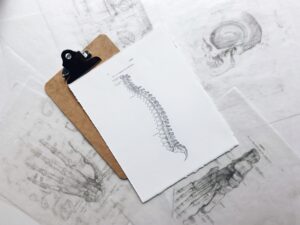A chiropractic wellness center treats patients with conditions that affect their bones, muscles, ligaments, nerves and tendons. In general, chiropractic centers employ a chiropractor or group of chiropractors. Most centers also employ therapists and office personnel.
Chiropractor
Most people visit a chiropractor because of an injury or a medical condition. For instance, some people need chiropractic therapy after a car accident. Others see a chiropractor for a condition such as scoliosis, a herniated disc or sciatica. At least one licensed chiropractor works in every chiropractic wellness center. The chiropractor sees and treats patients.
As far as education, chiropractors typically have a Doctor of Chiropractic (D.C.) degree along with a state-issued license. The doctorate degree takes about four years to complete. Each chiropractic school has slightly different admission requirements. However, many require a 4-year degree for admission. Other schools require that the student complete at least three years of an undergraduate degree program before being admitted to a doctoral program.
Chiropractors generally begin to advise a patient on a treatment plan after meeting with the patient and performing a physical exam. X-rays might be required. In general, chiropractors are responsible for the following duties at chiropractic centers:
- Assessment of a patient’s medical condition
- Review of a patient’s medical history to develop a treatment plan
- Examines a patient’s bones, posture and reflexes
- Performs neuromusculoskeletal therapy, which can include adjusting the patient’s joints and spine
- Gives advice on wellness, nutrition and lifestyle choices that can improve a patient’s physical condition
- Makes referrals to other medical professionals
- May work together with physical therapists and other specialists to treat patients
Therapists and Office Personnel
Many chiropractic centers also have physical therapists who work with patients. Physical therapists tend to be self-employed. To work in the field, a physical therapist needs a master’s or a doctoral degree. Every state also requires the therapist to be licensed.
The typical job duties of a physical therapist are as follows:
- Helps the patient manage pain
- Recommends exercises and stretches to treat health conditions
- Reviews notes from other healthcare workers in order to develop a treatment plan
- May help diagnose a patient’s physical problems via examination or observation
- Evaluates patient progress and modifies the treatment plan as needed
- Educates patients about the importance of exercise in achieving and maintaining a healthy body
Massage Therapists
A massage therapist uses his or her hands along with specific equipment to manipulate soft tissues and muscles in a patient. Massage therapists do not need an advanced degree. Most of them have a high school diploma and a certificate from a training program. Most states require therapists to complete a certain number of training hours and to earn a certificate or license.
Massage therapists generally work with patients who have been injured or have a medical condition. Some massage therapists also treat patients who feel stressed or have health concerns related to anxiety. One goal of massage therapists is to help alleviate pain by massaging various body parts.
Other duties of a massage therapist are as follows:
- Discusses the patient’s major concerns and goals for each therapy session
- Assesses and locates physically painful body areas and find ways to treat those areas
- Touches and manipulates a patient’s muscles and soft tissues
- Suggests possible relaxation techniques for clients
- Records information about the client’s progress and physical condition
Office Workers
Most chiropractic centers also employ office personnel. Such personnel work as receptionists or administrative assistants. They generally have a lot of contact with patients. They are responsible for greeting patients and providing them with general information about the practice. Receptionists answer phones, make appointments and process payments.
In general, receptionists and another office personal are responsible for administrative duties. They manage paper files, handle computerized records and maintain the office calendar. They are responsible for handling office equipment, such as phones, computers, shredders and other electronic devices.
If you need more information on chiropractic care, call us today at 123-456-7890. We can help. Call us now at 205-637-1363








